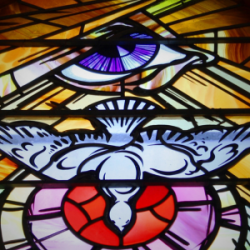Welcome readers! Please subscribe through the buttons on the right if you enjoy this post.

In both Matthew’s and Luke’s gospels we read:
“If any of you put a stumbling block before one of these little ones who believe in me, it would be better for you if a great millstone were fastened around your neck and you were drowned in the depth of the sea. Woe to the world because of stumbling blocks! Occasions for stumbling are bound to come, but woe to the one by whom the stumbling block comes!” (Matthew 18:6-7)
“Jesus said to his disciples, ‘Occasions for stumbling are bound to come, but woe to anyone by whom they come! It would be better for you if a millstone were hung around your neck and you were thrown into the sea than for you to cause one of these little ones to stumble.’” (Luke 17:1, 2)
We stumble when we’re learning to walk. Here, we are focusing on those who are walking toward a safer, more just, and compassionate world, and we’ll be considering how as they move forward, others will actively obstruct their path rather than smoothing it out. Obstructionists place stumbling blocks in the way of those moving forward, causing their advance to be harder than it should be.
We are considering one of Jesus’ sayings about “little ones.”
The family structure in Palestine in the first century was a hierarchical pyramid with the male patriarch at the top. On the bottom rung of the social ladder, below slaves, were children (see Galatians 4:1).
Social status is typically evaluated by the degree to which one has both power and resources. Those with large measures of control over power and resources operate in higher social positions, while those with very little access to power and resources live at the bottom.
Children have access to neither power nor resources. The typical avenues to power and control of resources are education, income, or work. In our societies, children have none of these, and they are vulnerable to abuse and neglect so child advocacy and children’s rights are much needed. Discrimination on the basis of race, gender, sexual orientation, gender identity, national origin, religion, disability, color, or ethnicity is also compounded when they apply to children.”
Our focus in the above passage is directed toward the “little ones” Jesus spoke of—the most vulnerable sectors of society. In the Greek, “little ones” (mikros) can not only refer to children but also any who are vulnerable to exploitation by the status quo. It doesn’t have to mean a young person; it can also refer to a person’s “rank or influence” within a society. Christianity has a long history of doing damage to our most vulnerable and most marginalized.
Native People
One example in this history is the way Christian preachers and missionaries used the Canaanite conquest and genocide stories in the Bible to legitimize the genocide of Native peoples here in the U.S.:
“Biblical notions of extirpation influenced colonial America from the earliest days of the settlement. In a tract publicizing the new Virginia settlement, Robert Gray expressed the hope that Indians might accept Christianity, but if they did not, biblical commands were clear: ‘Saul had his kingdom rent from him and his posterity because he spared Agag . . . whom God would not have spared; so acceptable a service is it to destroy idolaters, whom God hateth.’” (Philip Jenkins, in Laying Down the Sword: Why We Can’t Ignore the Bible’s Violent Verses, p. 133)
During the colonial era, many New England preachers such as Cotton Mather compared Pequot Indians to modern Ammonites and New England to a modern Israel (see Cotton Mather, Magnalia Christi Americana, vol. 1, p. 553). With this interpretation, if Saul had had his kingdom taken away because he failed to utterly destroy the Ammonites, the new American Christians were not to fail in the complete annihilation of their modern, native “Ammonites” if they wanted to ensure their place on this continent, their “promised land.” The genocide of Native people was rooted in Christians’ lethal interpretation of violent Bible passages; it was a genocide they believed God had commanded them to execute.
Slavery
During the abolitionist years leading up to the American Civil War, many Christian preachers quoted Leviticus’ passages affirming slavery and claimed that neither Paul nor Jesus had reversed those passages. One famous preacher, ironically named Moses Stuart, wrote:
“Not one word has Christ said, to annul the Mosaic law while it lasted. Neither Paul nor Peter have uttered one. Neither of these have said to Christian masters: ‘Instantly free your slaves.’ Yet they lived under Roman laws concerning slavery, which were rigid to the last degree. How is it explicable on any ground, when we view them as humane and benevolent teachers, and especially as having a divine commission-how is it possible that they should not have declared and explicitly [so] against a malum in se [something evil in itself]?”
He confidently pronounced that those calling for the end of slavery “must give up the New Testament authority, or abandon the fiery course which they are pursuing” (Moses Stuart, Conscience and the Constitution; with Remarks on the Recent Speech of the Hon. Daniel Webster in the Senate of the United States on the Subject of Slavery, 1850).
Another minister, a Southern Methodist named J.W. Tucker, proclaimed to his Confederate audience fighting for their right to own slaves, “Your cause is the cause of God, the cause of Christ, of humanity. It is a conflict of truth with error-of Bible with Northern infidelity-of pure Christianity with Northern fanaticism.” (Kurt O. Berends, “Confederate Sacrifice and the ‘Redemption’ of the South,” in Religion and the American South: Protestants and Others in History and Culture, ed. Beth Barton Schweiger and Donald G. Mathews, p. 105.) Tucker’s rhetoric sounds almost identical to the rhetoric of Christians today as they condemn movement in many faith traditions toward the affirmation of LGBTQ people.
Against Women
Christianity also has a long history of patriarchy and misogyny. Roman Catholic writer John Paul Boyer explains in Some thoughts on the Ordination of Women:
“Being a Jew, being a Palestinian, being a first-century man—all these are what we might call, in the language of Aristotelian metaphysical, the ‘accidents of Christ’s humanity;’ but his being a man rather than a woman is of the ‘substance’ of his humanity. He could have been a twentieth-century Chinese and been, cultural differences notwithstanding, much the same person he was, but he could not have been a woman without having been a different sort of personality altogether.” (A Monthly Bulletin of the Church of St. Mary the Virgin)
Womanist scholar Jacqueline Grant rightly states in her book White Women’s Christ and Black Women’s Jesus that “the most significant use of this argument” came from Pope Paul VI on October 15, 1976, when he approved and published the following declaration:
“The Christian priesthood is therefore of a sacramental nature: the priest is a sign, the supernatural effectiveness of which comes from the ordination received, but a sign that must be perceptible and which the faithful must be able to recognize with ease. The whole sacramental economy is in fact based up on natural signs, or symbols imprinted up on the human psychology: ‘Sacramental signs’, says Saint Thomas, ‘represent what they signify by natural resemblance.’ The same natural resemblance is required for personas as for things: when Christ’s role in the Eucharist is to be expressed sacramentally there would not be this ‘natural resemblance’ which must exist between Christ and his minister if the role of Christ were not taken by a man. In such a case it would be difficult to see in the minister the image of Christ. For Christ himself was and remains a man.” (Franjo Cardinal Seper, Vatican Declaration, Feb 6, 1977, p. 6)
Never mind that the church’s own human origin/creation story states clearly that both male and female were made in the image of God. There have long been interpretations of these stories that have marginalized, wholly excluded, and damaged women personally and institutionally. Because of the patriarchal nature of many sectors of Christianity, and despite the fact that there are feminist and womanist Christians, some have gone so far as to say that Christianity is a man’s religion.
LGBTQ Fear
Anyone who lived through the 1980s here in the U.S. knows all too well how Christianity has done untold damage to the LGBTQ community, legitimizing the inmate homophobia of straight parishioners through interpretations that are trans-, bi-, genderqueer-, and homo-phobic. For a history that reaches back into the 1970s, the Southern Poverty Law Center offers an excellent history of the modern Christian anti-gay movement, starting with Anita Bryant in 1977. Just a quick read demonstrates how monstrously Christians have mischaracterized this community and used damaging interpretations of the Bible to bolster their mischaracterization. Jay Grimstead, a founder of The Coalition on Revival, bluntly stated that “Homosexuality makes God vomit”. Many similar arguments are rhetorically identical to those Christians in the 1800s used in their opposition to ending slavery. The Christian Moral Majority didn’t get its start opposing abortion or gay people, but by opposing integration after Brown v. Board of Education. They began a network of private Christian schools to make sure their White children did not have to attend school with Black and Brown children.
I’ve given you four examples of how interpretations of our sacred text have done and continue to do damage to those who are most vulnerable within our society. As I wrote last week,
“Interpretations are not eternal. They change with time. As we see the harmful fruit of present interpretations, we can make those interpretations give way to new ones, in the hope that new interpretations will bear the fruit of life. And if we see that our new interpretations also do harm, we will challenge them too. The goal is to continue to seek life-giving interpretations for all, work with people’s well-being and thriving in our hearts, and transform our world into a safe, just, compassionate home for us all. Anything less is not faithful to Jesus or the Spirit of our various sacred texts. Every time you’re tempted to mistake your interpretation for the sacred text itself, remember that interpretations are temporary. It’s okay for them to change, as long as what they change to is life-giving for all.”
In each of the above examples, a person can come up with Bible interpretations to oppose valuing and protecting Native people and lands, ending slavery, promoting equity for women, and seeking justice for the LGBTQ community. Some claim they are just reading the Bible plainly. But we never see things objectively. As the saying goes, we do not see things as they are; we see things as we are.
Our experiences determine not only the questions we ask but also the answers we get back. Plain readings are not plain but are read through the lens of our own paradigms and fears. And this is one reason why it is so vital if we are going to make our world safe and just for everyone, that we learn to listen to stories, experiences, and interpretations of our sacred texts from the most vulnerable communities in our society. This is how liberation theology was born: those in South America read the Bible very differently than their colonial Christian exploiters. It’s how Black liberation theology was born: Black Christians in the U.S. read the Bible radically differently than white Christians read it. It’s how feminist and womanist theologies were born and how queer theology was born. We need these voices and perspectives if we are to arrive at interpretations of our sacred text that cease to do harm.
Today we have a broad swathe of people who want nothing to do with Jesus because of the history of the church as the largest stumbling block in the path of the vulnerable in their work toward a world of justice and compassion. They see a Christianity that seems to habitually do harm, ever landing on the wrong side of history. They don’t see a Jesus who taught survival, resistance, liberation, and justice. They don’t see a Jewish Jesus on the side of the oppressed (Luke 4:18-19). Rather, that Jesus is eclipsed by a religion that was formed in his name. This gives me deep reason to pause. I know first-hand how my own faith has been fractured by watching Christian racism, misogyny, homophobia, and transphobia just in my local community here in West Virginia. I love Jesus, but I have zero tolerance for the kind of Christianity my family seems to be surrounded by where we live.
I believe we must be honest about the truth of our Christian history. As someone who loves the historic, first-century Jewish Jesus, I have simply become disillusioned with the most vocal sectors of Christianity in our culture, today. Recently again I’ve endured disappointment as Christians who should have been passionately living out the value of compassionate listening to the voices of the vulnerable, who claim to believe God love’s everyone, was more passionate instead to protect their own cherished privilege and win their misguided culture war than standing with those presently most vulnerable.
Does your God love the vulnerable or your theology? Which is it that should be given a priority of worth? As Emilie Townes states, “When you start with an understanding that God loves everyone, justice isn’t very far behind.” But what happens when you believe God loves everyone and that doesn’t lead to justice? What about when the ones preaching “God loves everyone” are the stumbling block for those working toward a safer, just, more compassionate world for the vulnerable?
I take our passage above very seriously. It was said to Jesus’ followers, and we who take his name today must allow this passage to confront us, today, as well.

















